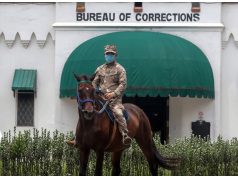MANILA – The Commission on Audit has declared illegal the joint venture agreement between the Bureau of Corrections and the Tagum Agricultural Development Corp. (Tadeco), which sparked a mega-conflict between erstwhile friends Speaker Pantaleon Alvarez and Rep. Tonyboy Floirendo, both political allies of the President.
Following an exhaustive audit, COA recommended filing of graft charges against officials of the Department of Justice and the Bureau of Corrections who approved the joint venture, which allowed the Floirendo-owned agricultural company to use the sprawling area of the Davao penal colony.
Speaker Alvarez, a fellow Davaoeño and ally of Floirendo, denounced the deal earlier this year and asked the DOJ to investigate the agreement.
Amid reports that a feud between their respective girlfriends had sparked the row between Alvarez and Floirendo, President Duterte weighed in and said his two allies were not fighting over women.
No public bidding
Tadeco used 3,000 hectares of land in the Davao prison and penal farm in Tagum City starting in 1969, an area which later grew to 5,000 hectares in the renewal of the contract.
According to COA, the officials who approved the JVA may be prosecuted for violation of the Anti-graft and Corrupt Practices Act.
COA said the agreement did not undergo public bidding before BUCOR decided to grant TADECO the right to use land of the Davao prison and penal farm.
The land at Davao penal farm cannot be leased because it is “non-alienable,” COA’s report said.
The Constitution limits to 1,000 hectares the land of this kind to be leased out, but in this case, BUCOR allowed TADECO access to 5,000 hectares, noted COA.
The period of access granted by BUCOR to TADECO, including the renewal, is, at 60 years, way too long, the state auditors said.
It also breaches the constitutional limit of 50 years.
COA recommended cancellation of the agreement, or at the very least its revision, to make it compliant with the Constitution.










